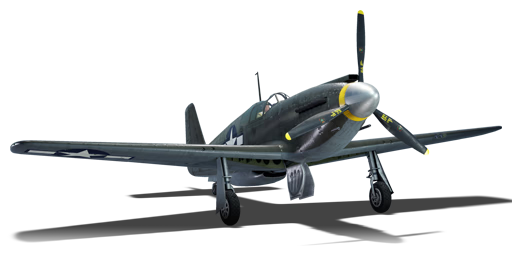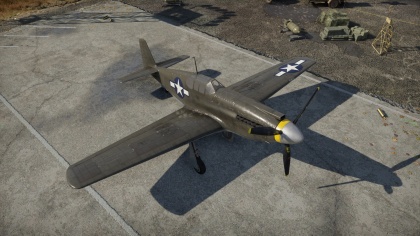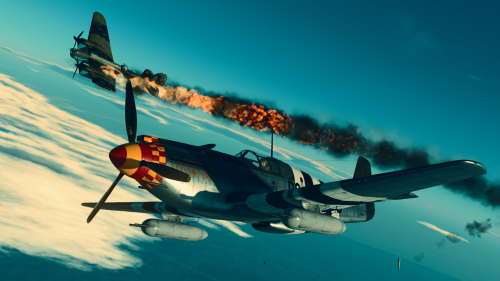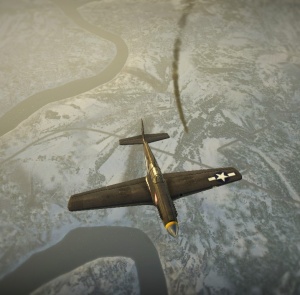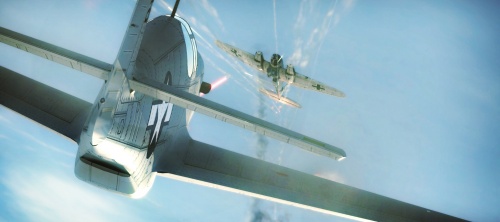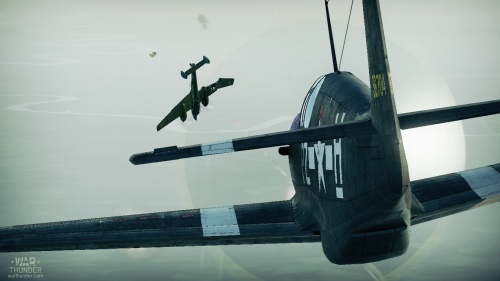Difference between revisions of "A-36"
m (Added images.) |
(Added information .) |
||
| Line 119: | Line 119: | ||
=== Survivability and armour === | === Survivability and armour === | ||
<!-- ''Examine the survivability of the aircraft. Note how vulnerable the structure is and how secure the pilot is, whether the fuel tanks are armoured, etc. Describe the armour, if there is any, and also mention the vulnerability of other critical aircraft systems.'' --> | <!-- ''Examine the survivability of the aircraft. Note how vulnerable the structure is and how secure the pilot is, whether the fuel tanks are armoured, etc. Describe the armour, if there is any, and also mention the vulnerability of other critical aircraft systems.'' --> | ||
| + | ;Protective plates and glass | ||
| + | * 38 mm Bulletproof glass in front of the pilot | ||
| + | * 11.11 mm Steel plate behind the pilot | ||
| + | * 6.35 mm Steel plate in front of the engine | ||
| + | * 6.35 mm Steel plate between engine and pilot | ||
| − | + | The {{PAGENAME}}’s armour configuration does a decent job of protecting the pilot, especially in frontal or head-on attacks. From behind the pilot’s seat backs up to an 11.11 mm steel plate, however from the front, the canopy windscreen contains 38 mm bulletproof glass. There is also a 6.35 mm steel plate both in front of the engine and behind it between the engine and the cockpit. To get to the pilot, bullets from the front will need to pass through the first plate, the engine and then the second plate. The chances are the engine will be disabled before the pilot is knocked out in a head-on attack. The front-most steel plate will help to protect the engine from smaller calibre machine gun fire, however, it does not fare so well once you start going against +20 mm rounds which have a greater punch. | |
| − | + | ||
| − | + | Keep up speed and manoeuvrability which will make it difficult for any enemy fighter to get a bead on you and the different steel plates should do their job in protecting the fighter from stray bullets. The {{PAGENAME}} when outfitted with gun pods can become an absolute terror especially during head-on attacks, however, don’t think that just because of the armour in the aircraft, you are fine. Remember when performing head-on or diving attacks on bombers fire off rounds and then manoeuvre as bullets headed your way in which you fly into will have a greater impact, it is imperative to move out of their way rather than take a chance and hope that a 6.35 mm steel plate will fully protect the engine or the pilot. | |
| − | |||
== Armaments == | == Armaments == | ||
Revision as of 10:34, 4 October 2019
Contents
Description
The A-36 Apache is a rank American attacker
with a battle rating of (AB), (RB), and (SB). It was introduced in Update 1.51 "Cold Steel".
The A-36 is the ground strike variant of the P-51 Mustang. Aside from the obvious difference of being able to carry bombs, the A-36 also has air brakes mounted on the wings of the aircraft and is more agile than the P-51. The standard use of the A-36 is to start by bombing, then either to strafe soft ground targets or else to act as a fighter, as the situation requires. It is particularly effective at escort roles, since it can either assist front-line bombers to take out ground units or to engage interceptors as the need arises. Please note that this plane excels at destroying tanks by targeting roof armor with gun pods attached. In addition, one could play this plane as a Boom & Zoom fighter when gun pods are equipped.
The Apache's armament is 6 x 12.7 mm M2 Browning machine guns (with four more available with suspended gun pods), which is respectable for its rank. Further, two of the guns are fitted in the nose (albeit the bottom of the nose). The A-36's nose-mounted guns allow more focused/accurate targeting and a smaller spread of fire. Though the plane can be difficult to handle for a novice pilot, with practice it can be used to great effect. Thus, A-36 pilots should not shy away from assisting friendly fighters if an opportunity arises to do so.
General info
Flight performance
Describe how the aircraft behaves in the air. Speed, manoeuvrability, acceleration and allowable loads - these are the most important characteristics of the vehicle.
| Characteristics | |||||||
|---|---|---|---|---|---|---|---|
| Stock | |||||||
| Max Speed (km/h at 1,760 m) |
Max altitude (meters) |
Turn time (seconds) |
Rate of climb (meters/second) |
Take-off run (meters) | |||
| AB | RB | AB | RB | AB | RB | ||
| 556 | 542 | 23.4 | 24.2 | 9.7 | 9.7 | 400 | |
| Upgraded | |||||||
| Max Speed (km/h at 1,760 m) |
Max altitude (meters) |
Turn time (seconds) |
Rate of climb (meters/second) |
Take-off run (meters) | |||
| AB | RB | AB | RB | AB | RB | ||
| 621 | 589 | 21.3 | 22.3 | 17.4 | 13.1 | 400 | |
Details
| Features | ||||
|---|---|---|---|---|
| Combat flaps | Take-off flaps | Landing flaps | Air brakes | Arrestor gear |
| ✓ | ✓ | ✓ | ✓ | X |
| Limits | ||||
|---|---|---|---|---|
| Wing-break speed (km/h) |
Gear limit (km/h) |
Combat flaps (km/h) |
Max Static G | |
| + | - | |||
| 652 | ~11 | ~5 | ||
| Optimal velocities | |||
|---|---|---|---|
| Ailerons (km/h) |
Rudder (km/h) |
Elevators (km/h) |
Radiator (km/h) |
| < 550 | < 230 | < 550 | > 360 |
| Compressor (RB/SB) | ||
|---|---|---|
| Setting 1 | ||
| Optimal altitude | 100% Engine power | WEP Engine power |
| 762 m | 1,325 hp | 1,500 hp |
Survivability and armour
- Protective plates and glass
- 38 mm Bulletproof glass in front of the pilot
- 11.11 mm Steel plate behind the pilot
- 6.35 mm Steel plate in front of the engine
- 6.35 mm Steel plate between engine and pilot
The A-36’s armour configuration does a decent job of protecting the pilot, especially in frontal or head-on attacks. From behind the pilot’s seat backs up to an 11.11 mm steel plate, however from the front, the canopy windscreen contains 38 mm bulletproof glass. There is also a 6.35 mm steel plate both in front of the engine and behind it between the engine and the cockpit. To get to the pilot, bullets from the front will need to pass through the first plate, the engine and then the second plate. The chances are the engine will be disabled before the pilot is knocked out in a head-on attack. The front-most steel plate will help to protect the engine from smaller calibre machine gun fire, however, it does not fare so well once you start going against +20 mm rounds which have a greater punch.
Keep up speed and manoeuvrability which will make it difficult for any enemy fighter to get a bead on you and the different steel plates should do their job in protecting the fighter from stray bullets. The A-36 when outfitted with gun pods can become an absolute terror especially during head-on attacks, however, don’t think that just because of the armour in the aircraft, you are fine. Remember when performing head-on or diving attacks on bombers fire off rounds and then manoeuvre as bullets headed your way in which you fly into will have a greater impact, it is imperative to move out of their way rather than take a chance and hope that a 6.35 mm steel plate will fully protect the engine or the pilot.
Armaments
Offensive armament
The A-36 is armed with:
- 2 x 12.7 mm Browning M2 machine guns, chin-mounted (300 rpg = 600 total)
- 4 x 12.7 mm Browning M2 machine guns, wing-mounted (350 rpg = 1,400 total)
Suspended armament
The A-36 can be outfitted with the following ordnance:
- Without load
- 2 x 100 lb AN-M30A1 bombs (200 lb total)
- 2 x 250 lb AN-M57 bombs (500 lb total)
- 2 x 500 lb AN-M64A1 bombs (1,000 lb total)
- 4 x 12.7 mm Browning M2 machine guns, wing-mounted (340 rpg = 1,360 total)
Usage in battles
The A-36 is quite a unique aircraft for its rank. It is a sleek looking fighter-bomber and should be used as such. It has good speed for its rank and designation, decent armament and a good selection of payloads; the A-36's role varies depending on the game mode you play.
Air Arcade and Air Realistic - In air battles, you can target ground forces with your .50 cals, equip bombs and take out medium or heavy tanks or you can specialise as a fighter. For a slight performance drop, you can equip the gun pods, which makes this plane absolutely formidable against any aircraft, especially during head-on attacks. Fighters and bombers alike will take heavy damage if not fully destroyed by the ten .50 calibre machine guns. Generally, it is best to focus on enemy aircraft in Air Arcade, while leaving the ground attack to more dedicated aircraft.
Ground Realistic - Ground RB allows you to really let the A-36 shine. It performs very well in the fighter-bomber role. If you equip bombs, you can quickly dive into battle, bomb a target and then begin engaging enemy aircraft. If you instead equip the gun pods, you should also equip the ground targets belt. The high amount of AP ammunition allows you to penetrate most German and Japanese vehicles through the roof, while the belt still retains high levels of effectiveness against aircraft, allowing you to be a true multi-role fighter bomber. The gun pods also allow you to hunt heavily armoured aircraft like the IL2.
Tip: taking off in Simulator Battles
Sea-level maximum speed (Auto engine control, no secondary weapons): Altitude: just above sea level (minimum safe altitude: 5m/16ft), 100% throttle, elevator trim: 4% up, aileron trim: 1% left, rudder trim: 0%, you should get a true air speed of 523 kph/325 mph/282 kt. Maximum true speed (Auto engine control, no secondary weapons): Altitude: 1,760 m/5,775 ft, 100% throttle, elevator trim: 5% up, aileron trim: 1% left, rudder trim: 0%, you should get a true air speed of 536 kph/333 mph/289 kt.
Manual Engine Control
| MEC elements | ||||||
|---|---|---|---|---|---|---|
| Mixer | Pitch | Radiator | Supercharger | Turbocharger | ||
| Oil | Water | Type | ||||
| Not controllable | Not controllable Not auto controlled |
Not controllable Auto control available |
Controllable Auto control available |
Combined | Not controllable 1 gear |
Not controllable |
Modules
| Tier | Flight performance | Survivability | Weaponry | ||
|---|---|---|---|---|---|
| I | Fuselage repair | Radiator | Offensive 12 mm | DGP-1 | |
| II | Compressor | Airframe | FSBC mk.5 | ||
| III | Wings repair | Engine | New 12 mm MGs | ||
| IV | Engine injection | Cover | FMBC mk.1 | ||
Pros and cons
Pros:
- Decent armament for its rank
- Fast bomb reload unlike typical fighters in Arcade
- Highly agile for an attacker
- Two of the 6 x M2 12.7 mm machine guns are mounted under the fuselage, increasing accuracy
- Superior firepower than most other planes in rank
- Very good energy retention for an attacker
- Good performance at low altitude
- Very good dive speed
- Has air brakes
- Attacker spawn point, can be used to certain advantage
- It's a modified version the P-51 making it a decent fighter with the addition of two 12.7 mm machine guns in the bottom of the nose
- Can opt to equip 2 x DGP-1 gunpods, adding further 4 x 12.7 mm M2's to it's armament, giving the A-36 a very high burst-mass compared to its contemporaries
Cons:
- Fuselage mounted M2's are hooked up to a synchronizer, lowering their effective rate of fire (prevents them from shredding the propeller)
- Carrying payload slows you down
- Is not a dedicated attacker unlike the A-20G-25
- Will be easily out turned by fighters of other nations
- Does not have access to rockets or bombs over 500 lb, making it difficult to use against heavily armoured targets
History
Describe the history of the creation and combat usage of the aircraft in more detail than in the introduction. If the historical reference turns out to be too long, take it to a separate article, taking a link to the article about the vehicle and adding a block "/ History" (example: https://wiki.warthunder.com/(Vehicle-name)/History) and add a link to it here using the main template. Be sure to reference text and sources by using <ref></ref>, as well as adding them at the end of the article with <references />. This section may also include the vehicle's dev blog entry (if applicable) and the in-game encyclopedia description (under === In-game description ===, also if applicable).
Media
Excellent additions to the article would be video guides, screenshots from the game, and photos.
See also
Links to the articles on the War Thunder Wiki that you think will be useful for the reader, for example:
- reference to the series of the aircraft;
- links to approximate analogues of other nations and research trees.
External links
Paste links to sources and external resources, such as:
- topic on the official game forum;
- encyclopedia page on the aircraft;
- other literature.
| USA strike aircraft | |
|---|---|
| Douglas | A-20G-25 · A-26B-10 · A-26B-50 · A2D-1 · AD-2 · AD-4 · A-1H |
| North American | A-36 · PBJ-1H · PBJ-1J |
| Other | AM-1 · AU-1 · XA-38 |


